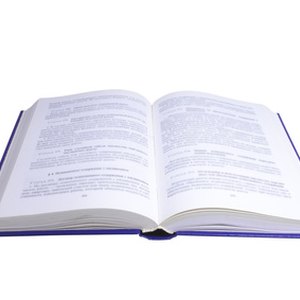
Legitimate commercial book publishers never require payment from their authors. However, other routes to publication require money from the writer. Nonfiction and fiction authors have different audiences, and therefore different options, when it comes to getting a book into print. Never pay for publishing unless you understand what you're getting into.
Types of Publishers
The basic types of publishers include the large, commercial publishers, often called traditional presses; small or boutique presses; vanity presses and self-publishing venues. Legitimate large and small presses will never ask an author to pay for publication. Self-publishing venues do require author payment because you are in charge of every step of the publication process, from editing to distribution. Vanity presses will put a book together for you, but you must pay for the process.
Warning
Generally, vanity presses are scams that masquerade as small presses, but require a fee from authors, which may be called an "editing fee," "packaging fee" or some other terminology. Work with vanity presses only if you want a book that does not sell to anyone other than your family and friends. For example, if you want to publish a family history just to have copies within the family, but don't feel you have the skills to self-publish, a vanity press might be an option for you.
Self vs. Traditional Publishing
Self-publishing requires that you pay for every step of your book's publication. This offers you complete control over the layout, cover art and editing, but also means you must handle all promotion and distribution. Traditional and small presses handle all of this for you, plus they will be able to get your book on shelves in bookstores that are not open to self-published material. Authors who write nonfiction material that has a clear target audience can benefit from self-publishing if they have strong marketing skills.
How It Works
In the traditional publishing model, which also applies to small presses, the publisher covers all fees to get the book into print. There may be some small costs to the author for copying and mailing the manuscript to other offices within the company, but these will be deducted from the author's payment once the book sells. Authors are usually given an advance, which is money paid up front for the right to publish the book. Publishers make their money from the book sales, and then give the author a percentage of this, called a royalty. The advance is actually a prepayment of the royalties, so the author won't earn more money unless the book sells enough to earn more than the advance.
Protect Your Work
Scams are common in the writing world, so always research a publisher before you commit to working with the company. Legitimate publishers are highly selective, so if a press guarantees that your book will be published before they've seen a full manuscript, beware. Several websites help new writers navigate the publishing world (see Resources), so you can arm yourself with the appropriate knowledge before you dive into the world of book publishing.
References
Writer Bio
Anne Hirsh has been writing and editing for over 10 years. She has hands-on experience in cooking, visual arts and theater as well as writing experience covering wellness and animal-related topics. She also has extensive research experience in marketing, small business, Web development and SEO. Hirsh has a bachelor's degree in technical theater and English and post-baccalaureate training in writing and computer software.

